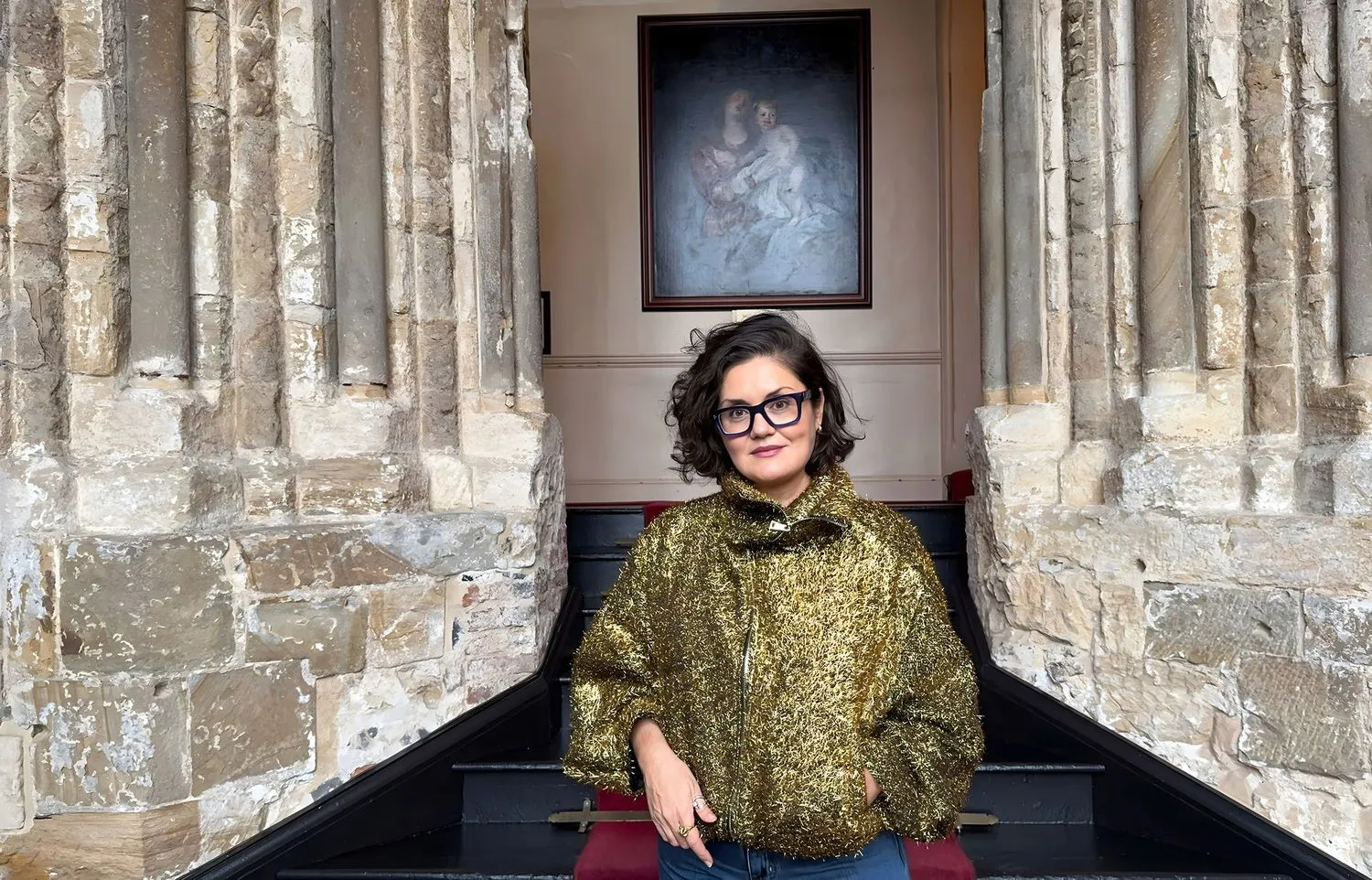 Georgia Kotretsos, visual artist, researcher, publisher and founder of THE TEΛΟΣ SOCIETY, Arts & Culture Research Lab Observatorium at the Castle, Palace Green, Institute of Advance Study Artist Fellow, Michaelmas 2025/26, Durham University, Durham, UK.
Georgia Kotretsos, visual artist, researcher, publisher and founder of THE TEΛΟΣ SOCIETY, Arts & Culture Research Lab Observatorium at the Castle, Palace Green, Institute of Advance Study Artist Fellow, Michaelmas 2025/26, Durham University, Durham, UK. The visual artist, researcher and publisher Georgia Kotretsos speaks from a position shaped by movement—across geographies, disciplines, and modes of cultural authorship. As the founder of THE ΤΕΛΟΣ SOCIETY, Arts & Culture Research Lab Observatorium, she has cultivated a practice that resists the conventional binaries that so often define contemporary cultural discourse: center and periphery, art and research, participation and authorship.
A non-physical platform founded in Athens yet operated outside the parameters of its urban centre, THE TEΛΟΣ SOCIETY proposes a different compass, one aligned with Greece's dispersed topography and the micro-cultures that emerge within it. Rather than treating these regions as marginal, Kotretsos approaches them as generative loci where knowledge accumulates collectively and where temporality, agency, and shared experience become mediums in themselves.
Throughout the conversation, she reflects on the organization's guiding premise: that culture is not produced by inherited narratives or centralized institutions, but through sustained, place-based inquiry—slow, attentive, and durational. Borrowing from philosophical understandings of telos — Aristotle’s idea that things have a final cause or ultimate purpose — she frames the work as a pursuit of purpose, treating meaning-making as an ongoing, attentive process. Her projects—whether symposiums held on remote islands, research embedded in forested borders, or publications amplifying local scholarship—are designed not as interventions, but as frameworks through which communities recognize their own authorship.
Georgia Kotretsos articulates a position that is neither activist nor detached, but one that understands culture as a lived practice of citizenship. Her approach resists the instrumentalization of art for politics while acknowledging the administrative realities that shape public space.
What emerges is an alternative model for cultural work—one rooted in attention, reciprocity, and the belief that knowledge grows outward from relationships rather than directives. As she continues her research in the UK and envisions the future of THE ΤΕΛΟΣ SOCIETY, Kotretsos gestures toward a horizon where interdisciplinary collaboration, care, and shared inquiry form the conditions for cultural evolution.
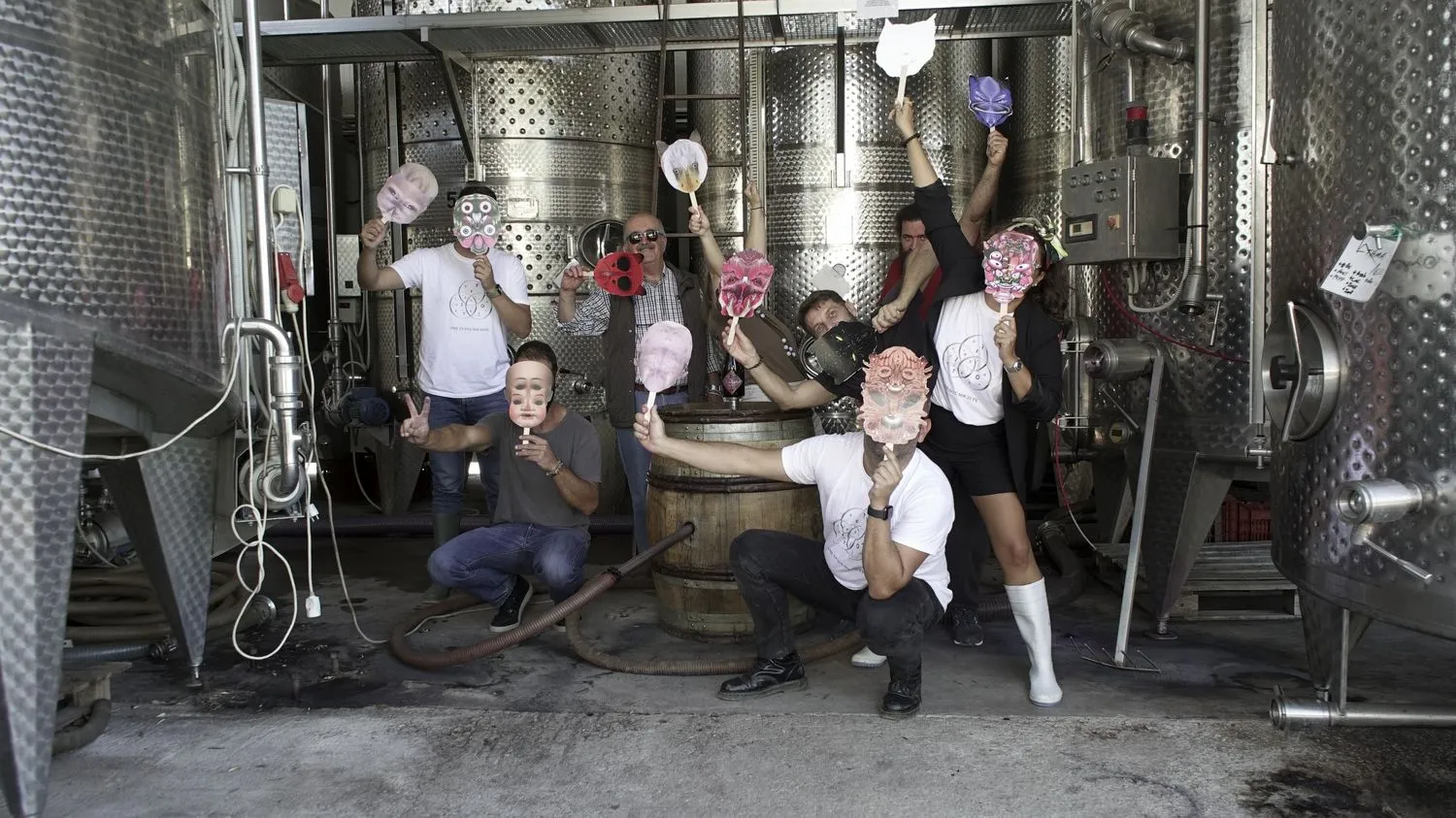
Dimitrios S. Spyrou: How would you define THE TEΛΟΣ SOCIETY, Arts & Culture Research Lab Observatorium and its mission in your own words? The name "THE TEΛΟΣ SOCIETY" suggests purpose, end, or goal — what does "telos" mean in the context of your work?
Georgia Kotretsos: THE TEΛΟΣ SOCIETY, Arts & Culture Research Lab Observatorium is a non-profit cultural research organization that works at the intersection of contemporary art, social and human sciences, and intangible heritage of Greece, as evident in the periphery. TTS defines its core field of study as Greece within its broader geographic context — the Balkans, the wider Mediterranean, and the MENASA region.
The cultural compass of THE TEΛΟΣ SOCIETY is shaped by the unique morphology of Greece—80% mountainous, dispersed across the mainland and hundreds of islands, nearly 170 of which are inhabited. This geography forms our expansive field of learning, inviting inclusion by decentralizing the creative dynamic and allowing it to emerge simultaneously from multiple locations.
Within this framework, interdisciplinarity becomes both a tool and a condition through which new concepts and original artistic forms can take shape. The idea that Greece’s cultural narrative emanates solely from a single urban center is a myth; instead, the country is defined by a constellation of micro-centers. It is within these diverse loci that we choose to expand.
"Τέλος" in Greek denotes an end or completion. In philosophical discourse—most notably in Aristotle—it signifies the intrinsic purpose or final cause of a being or action: the inherent aim toward which something naturally strives. Telos thus names not an endpoint, but the principle of fulfillment that gives form, direction, and meaning to existence, action (purpose, or ultimate aim).
So, when used in the context of THE TEΛΟΣ SOCIETY, the word suggests: a search for purposeful creation; an exploration of the ultimate meaning behind cultural forms; and a commitment to understanding how artistic and cultural practices reach their fullest expression, completion, or destiny in Greece through collective engagements.

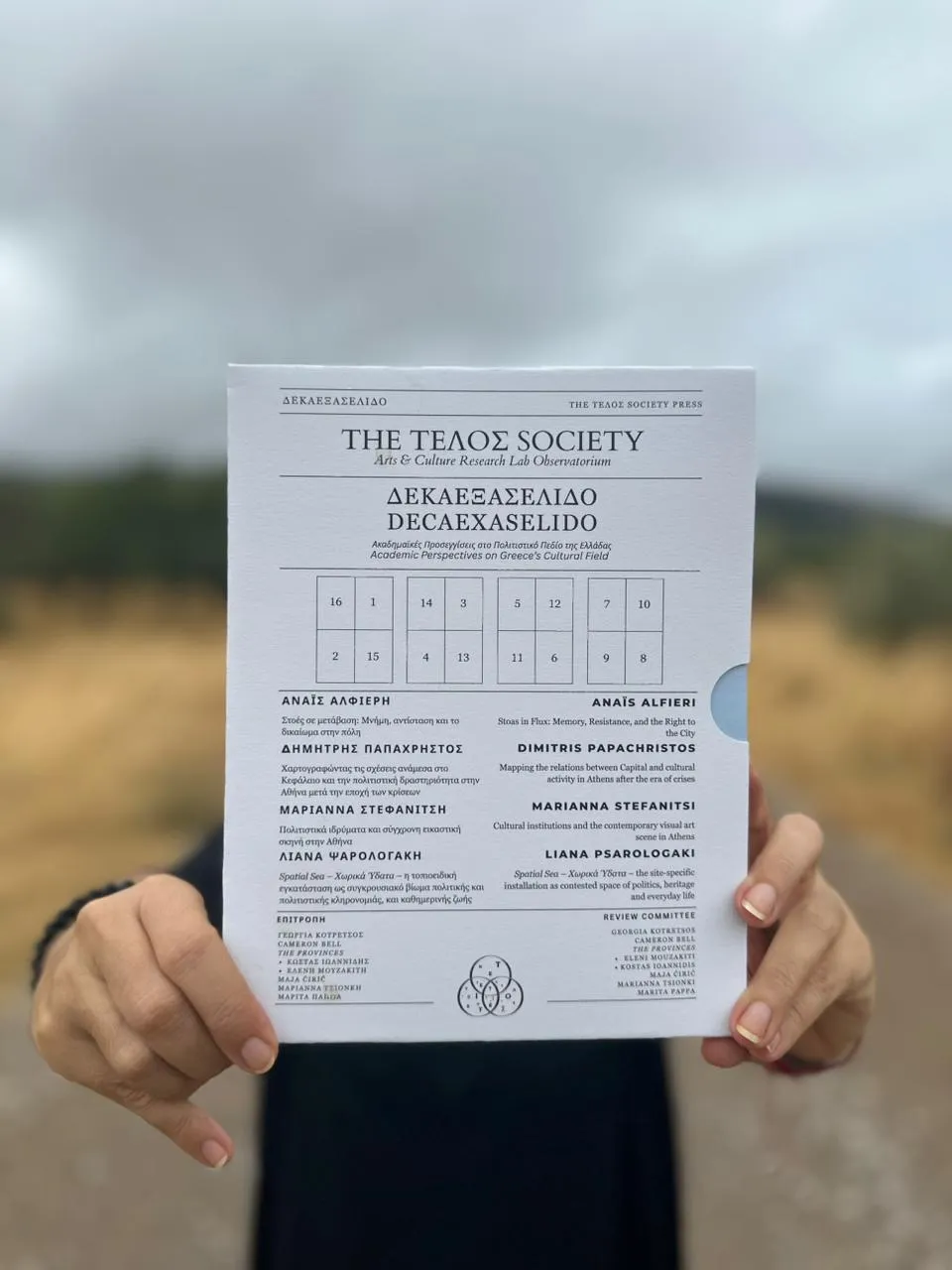
Dimitrios S. Spyrou: In the context of Greek society and culture, how does THE TEΛΟΣ SOCIETY create a welcoming space for dialogue and critique while also working toward concrete actions or interventions?
Georgia Kotretsos: By working with "time" as a medium — by using, re-imagining, and re-formulating a shared sense of temporality — we ask: in what temporal framework are we truly operating today, and what defines the core of our collective experience of the present moment? Is Greece culturally assigned to Eastern European Time, or are we also shaped by other temporalities — social, political, or historical?
Our projects are attentive to timeliness but always thematically timely: to the conditions set by duration, limitation, and the pressures that shape how time is experienced in different regions. TTS invests in thematic inquiries over two, three, or more years. Short-term approaches are rarely effective, and the scale and scope of THE TEΛΟΣ SOCIETY cannot accommodate fleeting projects.
Time allows us to process our work and funnel it through artistic and cultural forms before sharing it with our secondary community — our readers, audiences, and followers.

Dimitrios S. Spyrou: And, would you say its approach aligns with—or differs from—the traditional relationship between art and politics?
Georgia Kotretsos: In our work, artistic methods are never instrumentalized for political purposes. It would have been easy—perhaps even expected—to politicize our practice or to serve the shifting political agendas of various localities, but this is not our field. THE TEΛΟΣ SOCIETY is neither an activist platform aspiring to change the world nor a socially engaged or community-art initiative. It is a research-driven cultural platform that develops methodologies enabling communities to re-enlist in, and reclaim, their own agency. We practice citizenship through agency in culture.
THE TEΛΟΣ SOCIETY does not maintain a polemic relationship with politics; on the contrary, we are motivated by a desire to understand, not to intervene.
Clearly, the reforms that have reshaped Greece’s periphery since 1999 frame the broader context in which we operate, but they are not treated as instruments of our work. We are, though, continuously confronted with their aftermath and administrative architecture. The terrain of THE TEΛΟΣ SOCIETY is expansive and decentralized, yet our mission remains focused: to support those who inhabit these spaces — the custodians of Greece’s micro-cultures.
To recognize in each other this state of agency is to shift our attention from the center to the many marginal regions, highlighting the value and knowledge that emerge there. We advocate for agency in the form of authorship — the capacity to directly facilitate the shaping one’s own life in the present. From there, we extend outward: through our books, documentaries, educational initiatives, and through our Mentor Room, we make locally generated knowledge accessible to others. Our commitment to the people in the regions we work in is paramount.
And, on a personal note: in the arts, I have always directed my energy toward developing constructive proposals rather than participating in protests. This is not due to a lack of a critical lens, but rather a deliberate choice not to embed conflict within our program. There is simply no room for it in the work we do. If our aim is to create culture and attention-shifting programs, then I am committed to working with any authority or policy in place until we find common ground — as we have done on several occasions in the past.
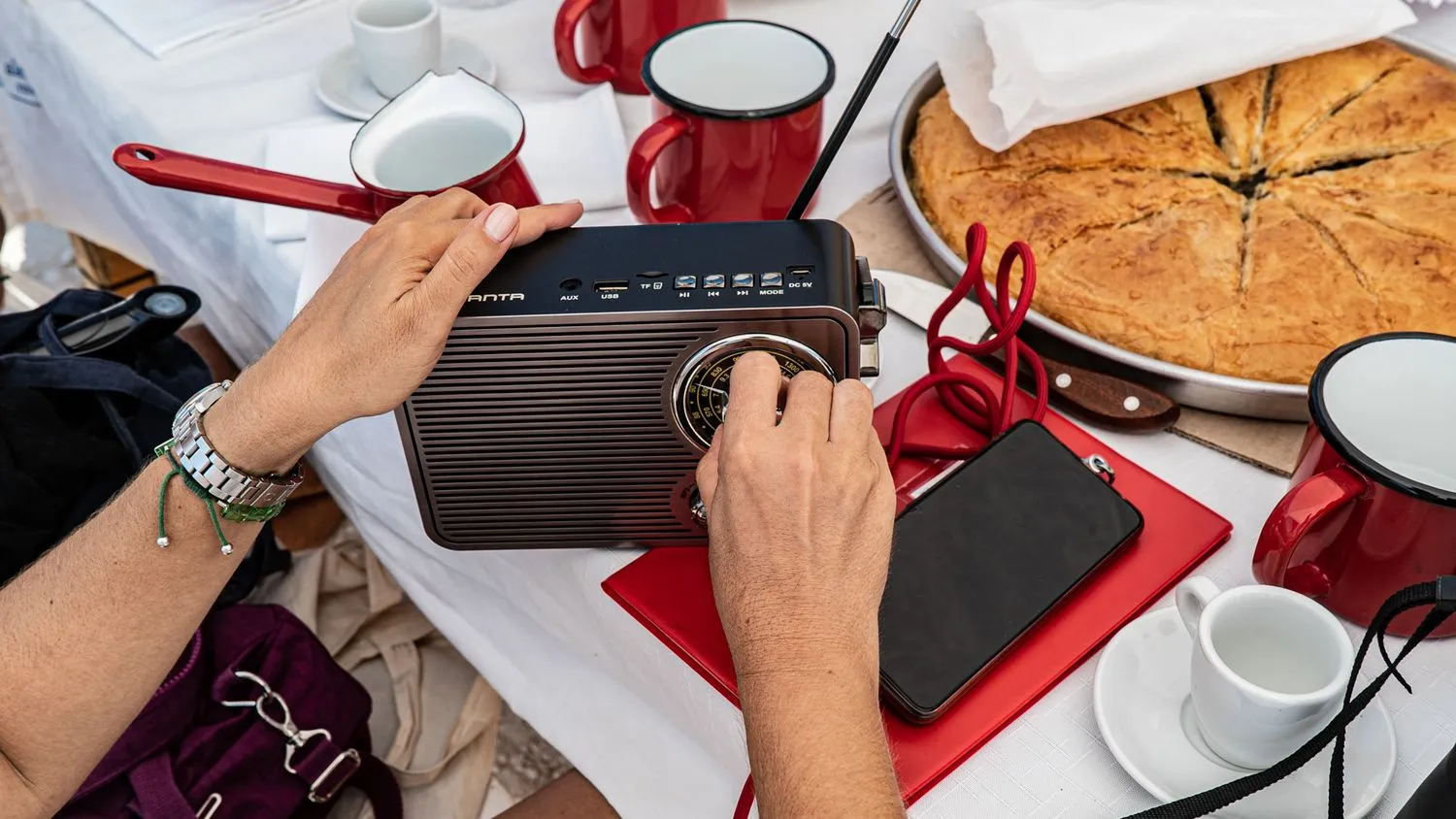
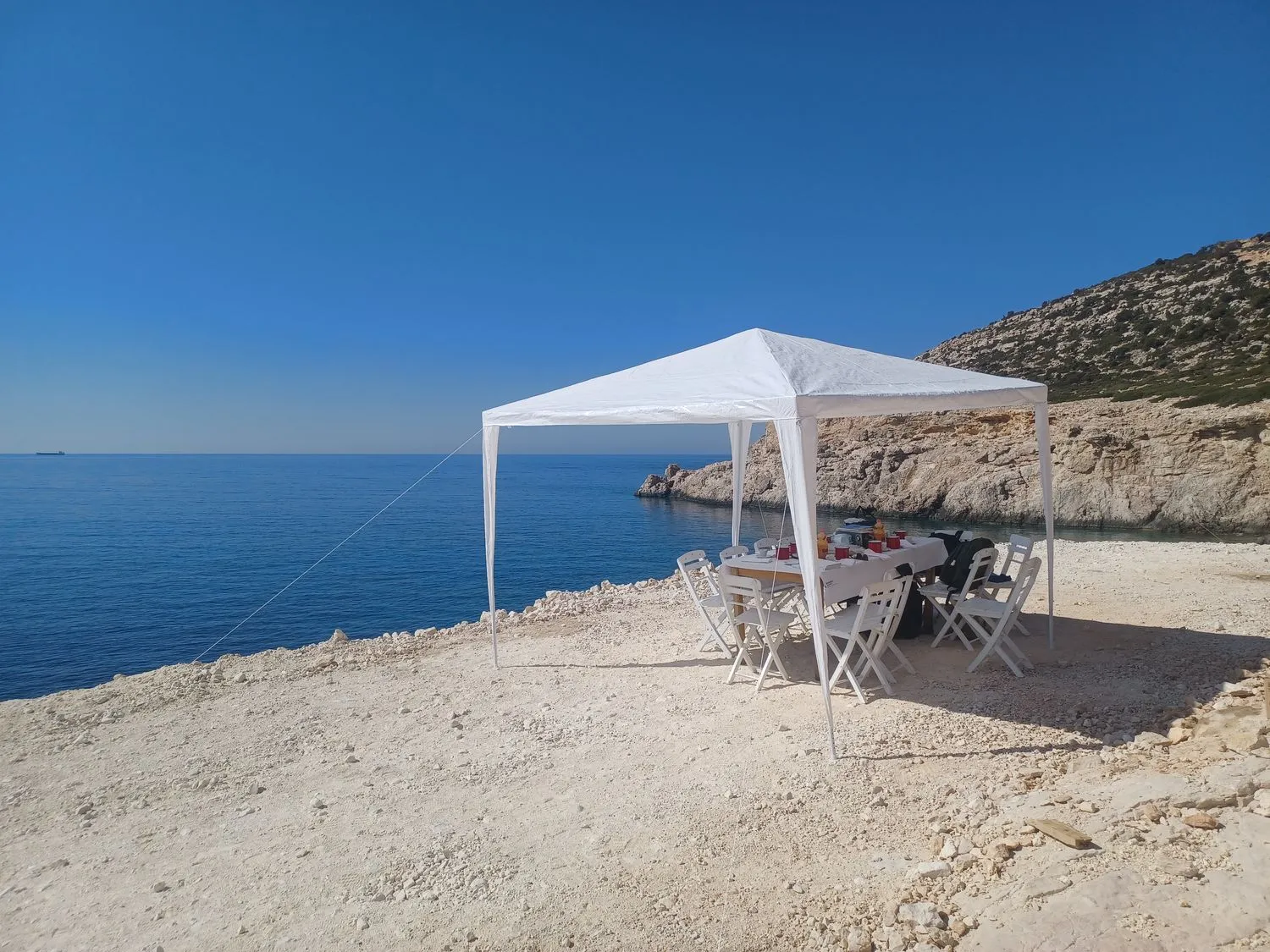
Such was the case with our program OBSERVATORY – EDGES (ΠΑΡΑΤΗΡΗΤΗΡΙΟ – ΑΚΡΑ | /pa.ɾa.ti.ɾiˈti.ɾi.o/ – /á.kraː/) in 2022, a multidisciplinary research initiative that unfolded across the municipal area of Megisti (Kastellorizo, Ro, Saint George of the Island, and Strongyli). The project was held under the auspices and with the support of the Ministry of Culture. Its culmination was marked by the first cultural symposium ever held on Strongyli, in the Municipality of Megisti—the easternmost point of Greece—on September 9th, 2022.
The same framework guided UNCREATED TIME, a multidisciplinary research program that took place in the region of Evros, also under the auspices and with the support of the Ministry of Culture. Its activities extended from Lefkimmi and Provatonas to Didymoteicho, while the research component of the program—initiated in the Dadia Forest—concluded in Ormenio and in the Petrota region of Orestiada. On Tuesday, September 3, 2024, in Didymoteicho, we marked the culmination of the program with a SYMPOSIUM: a gathering of local cultural representatives who identified common ground for collaboration and laid the foundations for a shared cultural strategy. The meeting took place at the AVATON Cultural Tech Space, and one year later, it gave rise to another project titled Fertile Land.
Similarly, for our Ismail Art Project, realized in collaboration with the Panormos Cultural Centre Yiannoulis Chalepas and unfolding in the birthplace of the sculptor—within the abandoned settlement of Ismail in Tinos—we did not communicate the intense processes or complexities behind the work. The same remains true for our documentary CELLAR 10 on Achaia Clauss (2024-25), as well as for our current program in development, To Health, with a Glass of Water on the water arteries of Greece and how they have shaped culture, both under the auspices and with the support of the Ministry of Culture.
How is it possible to work in the public sphere without using the tools already in place—or without introducing additional ones when necessary—to secure everyone's involvement? A significant portion of our budget is devoted to navigating and safeguarding these complexities, yet this aspect of the work remains unspoken, and in many ways, that silence is itself a political decision. TEΛΟΣ shares only the fragment that directly relates to our mission, that of the art world and our cultural.
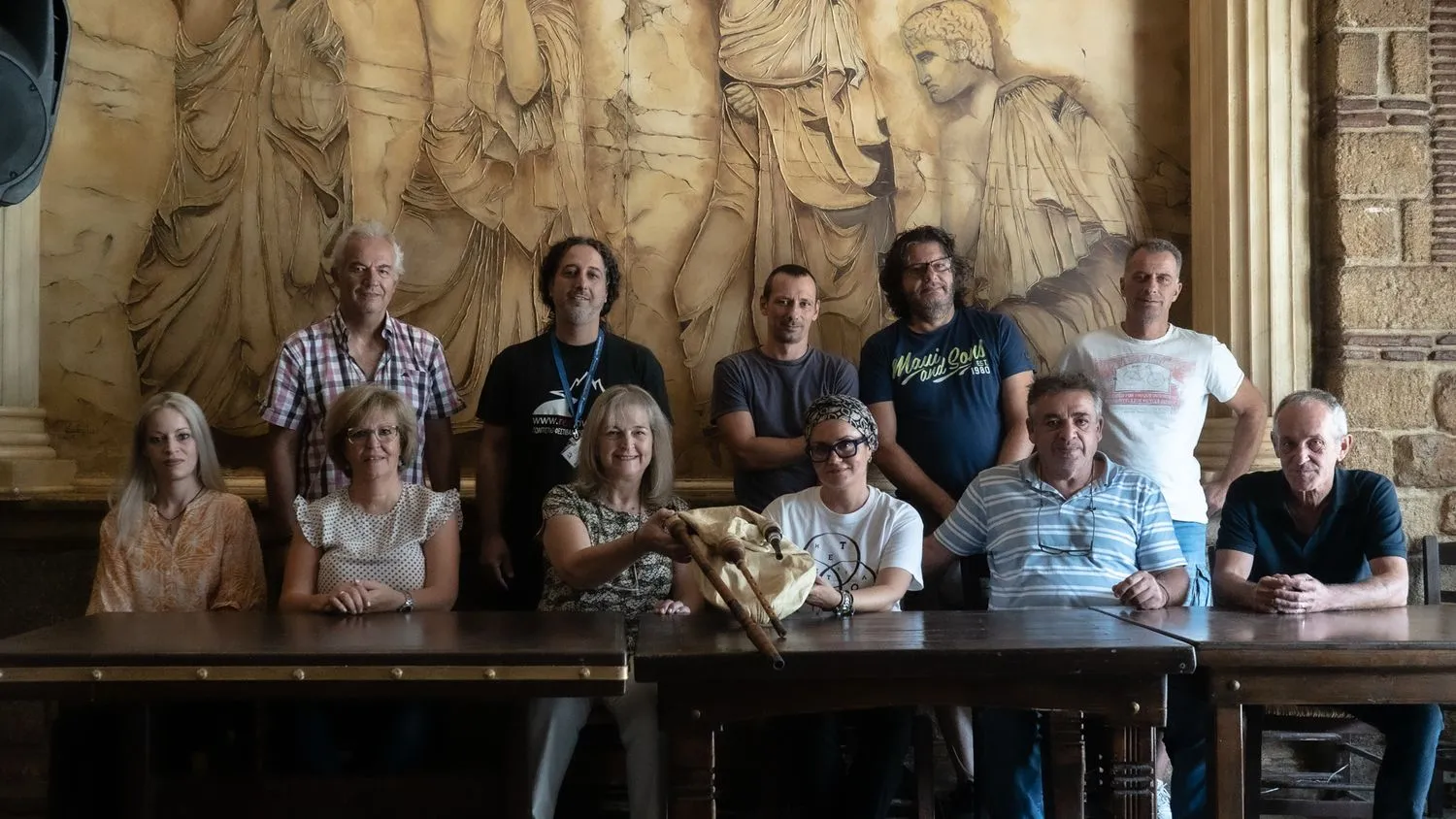
Dimitrios S. Spyrou: Since it began, THE TEΛΟΣ SOCIETY has developed projects across Greece that go beyond traditional art formats and transform into research projects, aiming to make experiences more approachable and inclusive. And when it comes to choosing the people or projects you collaborate with, what guides you — a research inquiry, an organic process, or specific questions you want to explore?
Georgia Kotretsos: THE TEΛΟΣ SOCIETY was founded precisely to serve this cause of place-based inclusion. Since 2019, we have conducted research for our books, realized programs, and created interventions in nearly seventy locations. We are present. And we sustain the growth even after we part ways.
The inquiries that guide us are always time-appropriate, bringing together people from different regions while generating new narratives by overcoming the landscape’s clearly defined impediments. Filtered through the arts, we contextualize and orchestrate the rules of our play. Encouraging adults of all ages — and children — to play, to construct rules of being with a common denominator, is a joy to witness. It is profoundly powerful. For instance, our project BREAD & CHARCOAL 2023-2025, under the auspices and support of the Ministry of Culture, took place in 13 different places, which allowed the conversation to change every single time.
What we seek through this process is a Bergsonian becoming: an updated version of the local, informed but not dictated by the center, shaped by change that grows from embodied commitment. We are there to cultivate a deeper understanding of place together — through our own gentle displacement.


Dimitrios S. Spyrou: Your projects often take place in unconventional or overlooked areas of the Greek periphery. What led you to focus on these places, and how does working in these environments shape or enrich your work?
Georgia Kotretsos: What is often labeled as ‘unconventional’ is precisely what we challenge. We do not regard any region or location in which we exercise our citizenship and our craft as unconventional.
THE TEΛΟΣ SOCIETY seeks environments in which it can grow and be measured against authentic conceptual, formal, and aesthetic forces that are wisely embedded in place — forces that have guided communities for generations and may continue to do so. The ingenuity that emerges within smaller communities, rural or peripheral areas is rarely attributed to a single author; it is shared among its members, or even held collectively.
Dimitrios S. Spyrou: Besides the interventions and programs TEΛΟΣ develops in various regions, in addition publishes book, and sometimes short films or documentaries. What motivates this choice, and how do these forms contribute to the overall purpose of your work? Are they simply natural outcomes of the projects, or are they essential for fully understanding each one?
Georgia Kotretsos: Absolutely, they are necessary. Books have been with us from the very beginning. With GREECE Educational Heurism Vol. 1 & Vol. 2, published in 2022, only a few months apart, we studied nearly 300 independent art spaces across Greece—research that unfolded over two years. From these, we featured 72 spaces in two volumes located in Evia, Tinos, Elafonisos, Thessaloniki, Kavala, Vamvakou, Lesvos, Nisyros, Piraeus, Pyrgos, Crete, Chios, Anafi, Paros, Syros, Amfissa, Kardamyli, Amorgos, Lavrio, Naxos, Ios, and Athens. In Carving the Negative, published in 2022, we communicated a method we developed for one of our programs in Tinos, Evia, and Lesvos, realized in 2021.
DECASEXASELIDO is an anthology series, intended to bring to the forefront current scholars working on issues that matter in Greece. Our first volume, published in September 2025, featured four 16-page booklets by: Anais Alfieri, Urban Designer and Specialist in Participatory Processes; Dimitris Papachristos, visual artist and researcher; Marianna Stefanitsi, researcher and visual artist; and Liana Psarologaki, Associate Professor and Head of Research and Impact, New Buckinghamshire University – Architect, NTUA, TEE, RIBA. Also in September, we published Yorgos Marazitis' artistic research TELL ME, focused on the post-industrial era of Patras.
CELLAR 10, centered on Achaia Clauss and its Imperial Cellar, is precisely that kind of example. To be entrusted with the history of Greece’s first winery—and with the dedication shown by the winery's Vice President, Mr. Periklis Mpaltas—was unparalleled. Until the projects are complete, we carry the weight of how to tell the world about them. There is magic in what we do—magic in how our collaborators evolve, in how narratives shift. There is always a thin line between one version of a story and another…
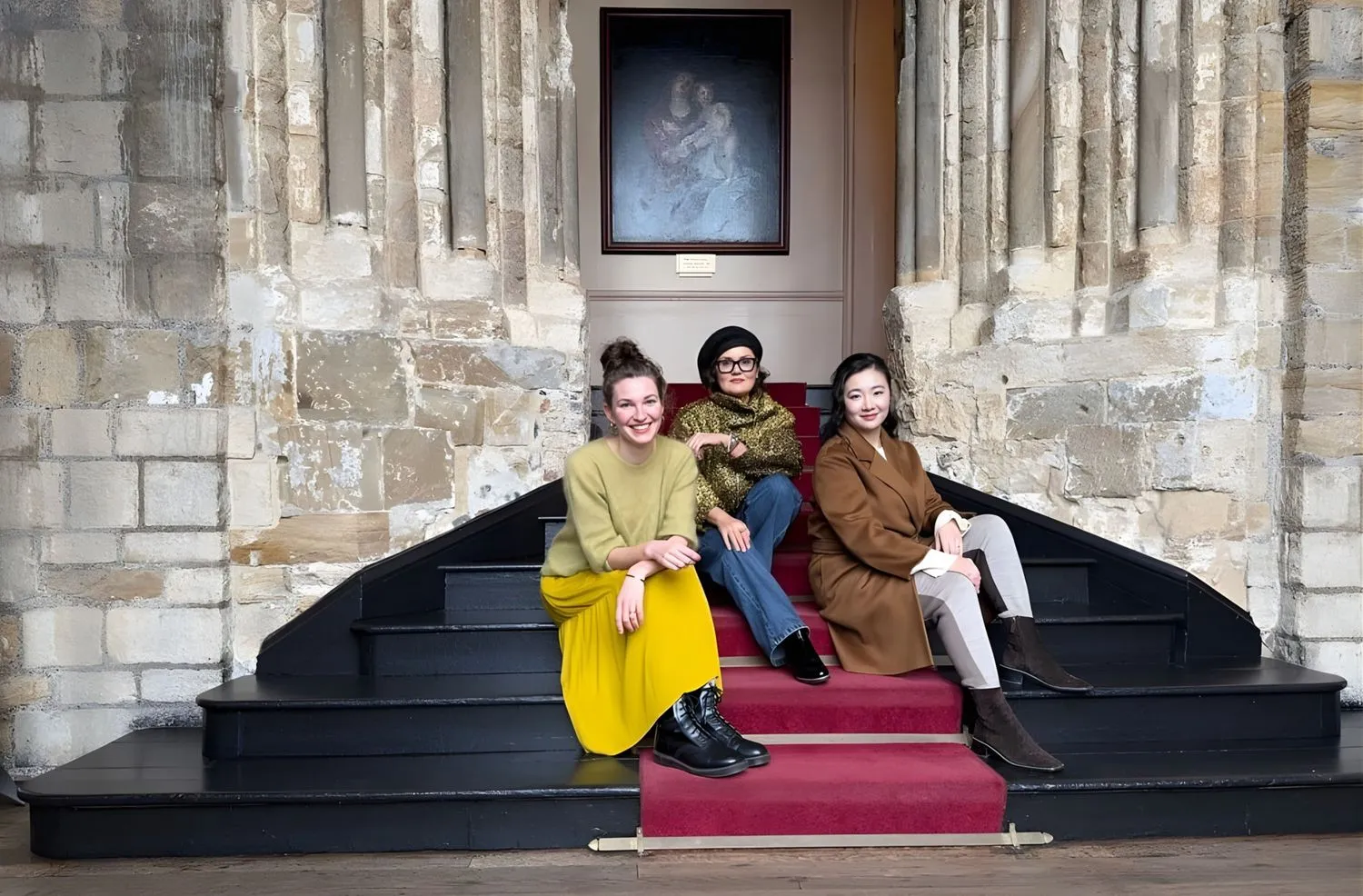
Dimitrios S. Spyrou: This interview finds you in the UK at the Institute of Advance Study. Since THE TEΛΟΣ SOCIETY's is an independent registered research platform, how significant is this development for you and your work—especially considering that, in the UK, you’re collaborating mostly with partners outside the arts and cultural sector? Does this shift move you away from your original vision for THE TEΛΟΣ SOCIETY, or do you see it more as a natural evolution or even a recognition of your efforts so far?
Georgia Kotretsos: Oh, I am in my element! Cross-disciplinary work across multiple sectors feels like an early Christmas—both personally and professionally. This nomination and invitation arrived with perfect timing: six years into our research, examining conditions and developing methodologies that allow THE TEΛΟΣ SOCIETY’s work to be applied to inquiries and studies of significant importance. This is precisely where we envisioned TEΛΟΣ belonging—holding a seat at the table, carving an earned place for the arts in research that matters.
Working alongside Dr. Karolina Nieberle, Associate Professor in Work and Organisational Psychology at Durham University, and Dr. Janey Zheng, Associate Professor in Leadership and Organisational Behaviour at Durham University—Principal Investigators for the Institute of Advanced Study's Major Project Arts Engagement and Mental Health at Work—is deeply meaningful. Together, we are exploring how loneliness is experienced at work across different career stages — from newcomers to career breaks, career peaks, and retirement. We will also compare loneliness experience across sectors and genders—among politicians, those in administrative and corporate roles, and those working in the arts—while integrating artistic methodologies and interventions to unravel this silent yet pervasive crisis. For TEΛΟΣ, this is a subject of profound interest as we encounter in our field people facing the same issues. Through this project, we expand our understanding of communities, structures, and the demographics of our collaborators and co-authors.
Challenging as it may be, this project—shaped with the guidance of Karolina and Janey—has reminded me, along with many of our peers here, what it means to think together in a state of profound mental peace, with our goals aligned and directed toward improving not the entire world at once, but a small part of it—our chosen field of focus. Their previous work on the subject serves as our guide and pathway for exploration. I could not feel more grateful, illuminated, or fulfilled to be part of this team. My work, contribution, and presence here are valued and through, and I am being offered a rare environment in which to grow—a place where care is immense, and where the gentle drive that human sciences require to thrive is not only present, but deeply felt.
In addition, the physical environment itself is a grand stage that wipes clean all distractions, small talk, and the trivialities of daily life, centering you in a place of clarity. It is a higher state of growth which, if not acknowledged, is easily lost. I am writing this from our team’s Garden Stairs office on the second floor of a World Heritage Site—the Castle—overlooking the Cathedral Church of Christ, Blessed Mary the Virgin, and St Cuthbert of Durham. The shadows are cast so sharply and crisply that the architecture defines the space, humbling all who stand beneath it—or across from it, as I do.
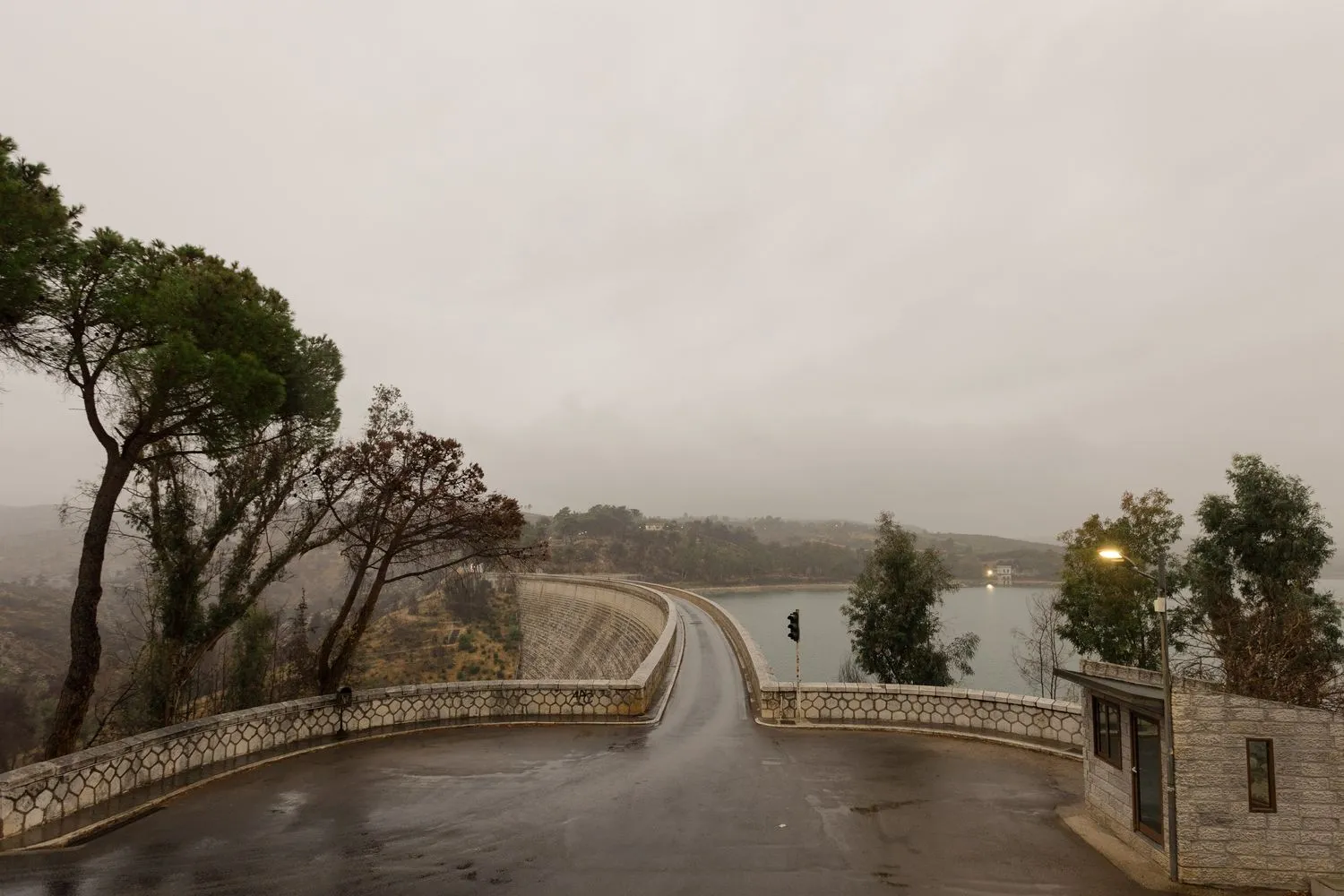
Dimitrios S. Spyrou: What directions or themes are you most excited to explore next through THE TEΛΟΣ SOCIETY? And if you think about ΤΕΛΟΣ —its long-term purpose—how do you imagine the organization and its work ten years from now?
Georgia Kotretsos: Over the next four years, TEΛΟΣ will undertake an interdisciplinary research project exploring Greece's water arteries and the ways in which they have shaped our culture. We begin in Athens and the wider Attica region, with plans to expand beyond this geographical area in 2026.
The project was launched this fall with an educational program, followed by an artist residency with photographer Nick Tsakanikas, who is documenting a journey along these waterways through his lens. We are also showcasing the collection of Apostolis Artinos—collector, author, and curator—and will continue expanding the project through films, field research, and water tastings led by our certified water sommelier, Yiannis Korovesis. Over time, we will introduce the rest of our team and the full scope of the program. It is one of the most exciting ventures we have undertaken.
Our work will unfold gradually, revealing the intricate connections between water, our cities, and our cultural landscapes. We have also launched an open call for the next DECASEXASELIDO, focused on water-related research in Greece and Cyprus. The call is available on our website under 'News.'
Financial support is essential at this stage of expansion. It is time for us to build partnerships that will allow our projects to grow with integrity. We are grateful for the support of the Ministry of Culture, yet it represents only a fraction of our actual costs. Our sustainability, longevity, and our ability to continue serving as active carriers of the stories and urgencies of our immediate worlds depend on the support we receive. I now envision leading our programs alongside enthusiastic, knowledge-driven, big-picture-thinkers as partners who are invested in Greece as deeply as we are and to expand on our consultancy services in the Greek periphery.
It has become my life, so I am careful with it, because I've changed through this work by carving a place for myself where I am content as an artist leading these manifestations alongside extraordinary people.